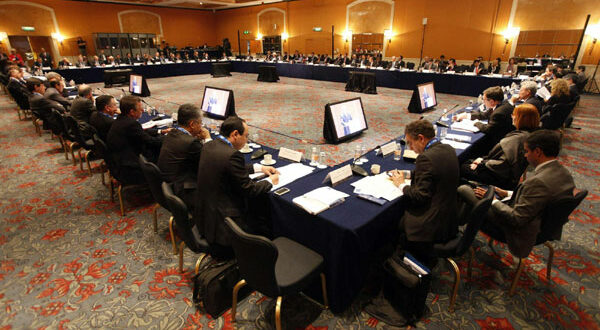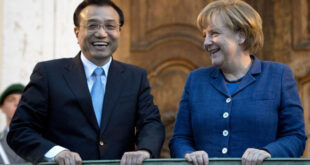Emerging markets are finding their voices within the Group of 20, a development that will reshape global efforts to avoid financial meltdowns and shape economic growth.
The dominant issue at this weekend’s G20 gathering of finance ministers and central bank governors is putting an end to worries that a big European economy could go bankrupt.
While the path to a resolution is fairly clear, the way forward remains blocked by a disagreement between the United States and Germany over the building of a financial backstop for the euro zone.
The clash by these two long-time rivals for the mantle of capitalism’s true champion is partly philosophical and partly political – both governments are wary over how their respective legislatures would react to the sight of either country getting any more involved in the potential bailouts of countries such as Italy and Spain.
Several G20 officials said before the meeting even began Saturday evening that a final solution for Europe – a financial backstop of more than $1-trillion (U.S.) funded by the euro zone and a $500-billion boost for the International Monetary Fund that would come mostly from G20 countries – would elude them this weekend.
A draft of the statement that the G20 will issue at the end of their meeting Sunday commits to reviewing the need for an increase in IMF resources at the group’s next meeting in April, Reuters reported, citing two unnamed officials.
The defeatist, and defeated, tone of the global economy’s traditional powers stood in contrast to the confident and increasingly assertive poise of officials from countries such as Brazil, Turkey and South Korea. Having managed to maintain healthy economies even as advanced nations falter, emerging market economies are starting to assert themselves at G20 talks three years after President Barack Obama declared the group to be the new steering committee for the global economy.
Ali Babacan, the Turkish deputy prime minister for economic and financial affairs, stood before a group of bankers Friday as their dinner speaker and calmly lectured the political leaders of the U.S. and Europe.
Remarking on the chronically fractured U.S. political system, he said there was not guarantee the world’s largest economy and leading democracy would produce a budget in 2012. The European Union simply takes “too long” to get things done, he said.
Mr. Babacan then put the European debt crisis in its proper perspective.
“We should be very, very careful to ensure this default door is closed for advanced economies,” he said. “When that door is opened, you don’t know how many more are going to go through it.”
There is a temptation to talk about the emerging market economies as if they are a single faction. In fact, they operate as any other country, seeking alliances and applying pressure in whatever way suits their interest.
Ahead of the G20 meeting, China and Japan said they would co-operate on the European situation, easing a rivalry for financial supremacy in Asia.
Brazil is showing itself to be an equal opportunity critic.
In an interview with Bloomberg News, Paulo Nogueira Batista, Brazil’s representative at the IMF, called out the U.S., saying the country’s opposition to boosting the IMF’s resources was impeding an agreement by the rest of the G20. “The reluctance or skepticism of a country the size of the U.S. is a handicap, especially if you consider that the G-20 is a consensus mechanism,” Mr. Nogueira Batista said.
At the same time, Brazil’s Finance Minister, Guido Mantega, said he agreed with the U.S.’s demand that Germany and other wealthy European countries boost the size of their firewall. Doing so is a condition of Brazil handing more money over to the IMF, as is a bigger say in how the fund is governed, Mr. Mantega told reporters in Mexico City.
But perhaps the most impressive show of assertiveness was a last-minute decision by Mexican President Felipe Calderon to summon to lunch a group that included U.S. Treasury Secretary Timothy Geithner, Finance Minister Jim Flaherty, Bank of Canada Governor Mark Carney and IMF Managing Director Christine Lagarde.
Mr. Flaherty told reporters before the meeting that he didn’t know the purpose of the meeting, although the assembly including the major players in the dispute over IMF funding. Mr. Flaherty’s spokeswoman, Mary Ann Dewey-Plante, declined to elaborate on the nature meeting late Saturday.
The political strength of the emerging markets will be tested in the weeks ahead over the selection of a replacement for World Bank President Robert Zoellick, who will resign when his term ends in June.
An American has held the post since the institution was created after the Second World War, and the Obama administration has said that it will soon nominate a replacement for Mr. Zoellick. Emerging-market officials say they want an open and competitive selection process this time, but stop short of committing to backing a candidate. The World Bank’s board of directors said it will choose a new leader in April.
That could be too soon for a group of countries that still is learning to how to play a diplomatic game in which the U.S. and Europe maintain the advantages of history and experience. But there’s no denying that the rules are changing.
“You need variable geometry,” Mr. Carney said Saturday while hosting a session on international economic policy. “We need big tables to be globally inclusive.”
Source: The Globe and Mail
 Asia Finance News Asia finance news, banking, market analysis, business, Forex, trade, Cryptocurrency as it is happening in Asia. Trusted gateway for Asian financial news.
Asia Finance News Asia finance news, banking, market analysis, business, Forex, trade, Cryptocurrency as it is happening in Asia. Trusted gateway for Asian financial news.





